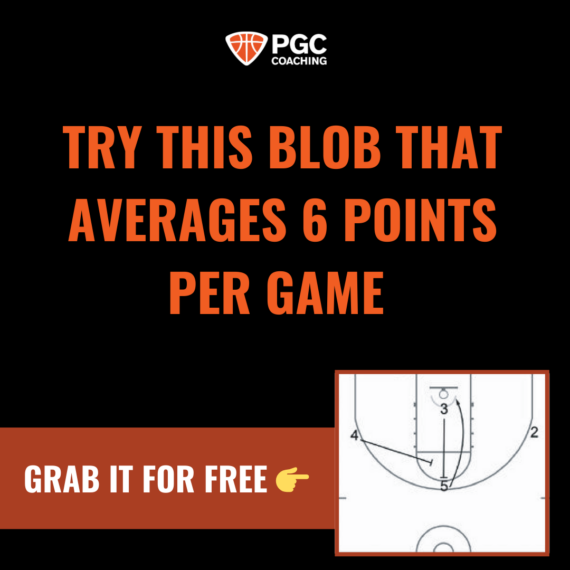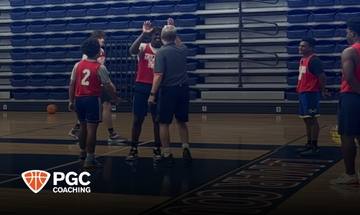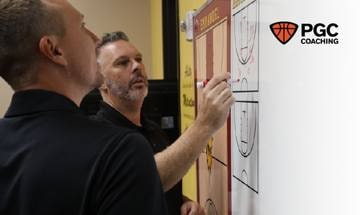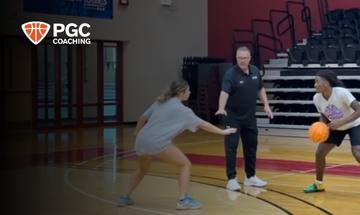Master Planning: The Missing Key to Better Practices and a Stronger Season
Mike Neighbors says for every hour of practice, there should be 3–4 hours of preparation.
Now, I get it—most of us don’t have time for that. Life’s busy. Schedules are packed. But don’t underestimate the value of intentional planning, especially when it comes to designing a full-season approach.
Here’s the trick when it comes to basketball practice planning strategies: if you can reverse engineer your practices, starting with the outcome you want at the end of the year and working backward, your team’s development will be more intentional, your practices more aligned, and your players more prepared.
And if you need additional guidance and are looking for more basketball practice planning strategies, here are a few you may also want to check out:
- How to Design Better Basketball Practices (Without Overthinking It)
- How to Execute a Great Basketball Practice
- Why I Spent 12 Straight Practices on the Read & React (and Didn’t Teach Defense)
Basketball Practice Planning Strategies: Start with the Big Picture and Plan the Whole Year
The best basketball practice planning strategies start by zooming all the way out:
- What does your off-season look like?
- What about the preseason?
- And how will you build through the in-season?
If you map it all out, you’ll start to see opportunities. You’ll also avoid that feeling of scrambling week to week without a clear direction.
Reverse Engineer: Year → Month → Week → Day
This is the framework we use:
1. Plan the Season
Put together a full calendar. Show your players when they’ll be off, when they’ll train hard, and when games hit. This helps you answer:
- When can we go all-out in practice?
- When do we need lighter, recovery-focused sessions?
You’ll be amazed at how much clarity this one step brings.
2. Win the Month
Ask yourself:
- What do we want to accomplish this month?
- How much shooting do we need?
- What culture pieces do we need to reinforce?
- Where does skill development fit in?
Start plugging those into the calendar with purpose.
3. Win the Week
What are our priorities this week?
Maybe you’ve got:
- 3 high-intensity practice days
- 1 game
- 1 off day
- 1 lighter practice
Now you can map it out: which days are for teaching, competing, recovery, or culture?
4. Win the Day
Finally, drill it down. What does today need to be about?
With all the work you’ve already done, you’re not guessing. You’re not plugging holes. You’re sticking to the plan.
Don’t Let Urgency Beat Strategy
Look—there are always going to be things you want to fix from yesterday’s practice or last night’s game. That’s natural. But reacting to every problem without a bigger strategy leads to chaos.
You end up chasing improvement instead of building it.
So here’s my encouragement:
- Reverse engineer your season.
- Think long-term.
- Plan with purpose.
- And design practices that align with the outcome you want—not just the issues you want to fix.
FAQ: Basketball Practice Planning Strategies – Map Your Season, Month, Week, and Day
Q: Why should coaches plan the entire season and not just week-to-week?
A: Planning the full season—off‑season, pre‑season, and in‑season—gives clarity and structure. It helps you:
- Identify ideal training blocks and recovery zones
- Align skill development with competition schedules
- Reduce reactive, stress-driven coaching decisions
This strategic view empowers purposeful growth, not chaotic fixes.
Create a full-season calendar to guide your planning and sharpen your focus.
Q: What does “reverse engineering” your season mean?
A: Reverse engineering means starting at the end (season goals) and building backward:
- Year: Determine competition peaks and blocks
- Month: Assign themes (shooting, defense, culture)
- Week: Outline intensity, teaching days, recovery
- Day: Set specific objectives (e.g. spacing, communication)
This layered planning ensures every practice supports your long-term goals.
Use this framework to design aligned, intentional training from day one.
Q: How do I set monthly priorities?
A: Ask yourself:
- What’s our core theme? (e.g. shooting, defense, communication)
- How much volume do we need in each skill area?
- Which practices are for teaching vs. competition vs. recovery?
Slot those themes into your calendar with purpose—and coach with clarity all month long.
Define monthly themes to build cohesive blocks of focused progress.
Q: How should I structure weekly practice around a game day?
A: Typically:
- 2–3 high‑intensity practices
- 1 game
- 1 recovery or light day
- 1 skill/culture session
- 1 off day
Plan each day’s focus (teaching, competing, recovery), then assign practice elements accordingly.
Build rhythm so every week serves a well-planned purpose.
Q: How do I turn daily objectives into real workouts?
A: After setting your daily goal:
- Choose drills and reps aligned with that goal
- Sequence drills to build energy and focus
- Link activity to the week’s theme (e.g. shooting drills for a shooting-focused week)
You’ll avoid “plugging holes” and instead focus on reinforcement and growth.
Start each practice with a clear theme and drill list tied to your vision.
Q: How do I balance urgent correction vs. long-term strategy?
A: Urgent issues (e.g. turnovers, poor rotations) deserve attention—but only within your strategic framework. Instead of overhauling your practice, allocate short corrections into the plan.
This moves you from “chasing issues” to “building habits.”
Use your plan to absorb feedback without derailing your priorities.
Q: What if things don’t go as planned?
A: Adjusting is part of the process. Simply:
- Identify what shifted—e.g. fatigue, injuries, unexpected losses
- Modify upcoming practice plans, not the overall strategy
- Revisit your monthly theme and refocus—it’s not about perfection, but direction
Use your plan as a GPS, not a script—and adapt as needed without losing your path.
Q: How can I track and measure progress effectively?
A: Incorporate:
- Weekly objective checklists (practices and wins)
- Monthly progress reviews (skill performance, culture development)
- Player feedback sessions to reinforce investment
This allows you to course-correct and celebrate small wins.
Commit to weekly reflections and monthly reviews to stay on track.
Q: Where can I find resources for advanced practice planning?
A: Within the PGC Coaching Community, you’ll find:
- Pre-built seasonal, monthly, and daily practice templates
- Strategy breakdowns from elite coaches
- Video demos and progress trackers you can customize for your program
Your first week is free—so you can see how it drives consistent improvement.
Try the PGC Coaching Community free for 7 days to elevate your long-term planning game.
Final Thought
When you approach practice planning this way—from the year, to the month, to the week, to the day—you’ll feel more confident. Your players will feel more confident. And your team will grow in all the right ways.
If you’d like to explore even more resources just like these, grab a free 7-day trial to get access to our members-only content.
– TJ
Check more practice planning and execution resources here.
About the Author
TJ Rosene
Coach TJ Rosene, head coach of the Emmanuel University men’s basketball team and Director of Coach Development for PGC Coaching, has spent his career shaping young athletes both on and off the court. With over 400 career wins and 12 seasons of 20+ wins, Rosene’s coaching experience is extensive and impressive. His teams have competed in six national championship games, winning three NCCAA National Championships. Under his leadership, the Lions made their NCAA Division II debut in 2018-19 and quickly captured two season titles and one tournament title, along with an appearance in the NCAA Division II Sweet 16 in 2021.
Rosene’s success expands far beyond the scoreboard. He’s been named National Coach of the Year three times and Conference Carolinas Coach of the Year twice. But for Coach Rosene, the most meaningful part of his work is the lasting impact he has on his players’ lives. As he puts it, “Coaching is a rare opportunity to shape and mold the lives of young people. It’s a privilege that I never take for granted.”
New Here?
Get coaching tips and tools like these delivered to your inbox each week!
Join the 15,000 coaches we’ve assisted…

Related Articles
How to Execute a Great Basketball Practice
Run sharper practices and adapt on the fly. Coach with purpose—every session counts.
How to Design Better Basketball Practices (Without Overthinking It)
Design smarter practices. Learn how to structure high-impact basketball sessions using intensity systems, learning arcs, and competitive decision-making—plus plug-and-play drills you can use today.
How to Teach On-Ball Defense That Actually Works in Games
Build lockdown defenders with 5 simple on-ball habits every coach needs to teach. Start winning more defensive battles today!
About PGC
PGC Basketball provides intense, no-nonsense basketball training for players and coaches. Our basketball camps are designed to teach players of all positions to play smart basketball, be coaches on the court, and be leaders in practices, games and in everyday life.
We combine our unique PGC culture with a variety of teaching methods and learning environments to maximize the learning potential of those that attend our sessions. In addition to spending 6-7 hours on the court each day, lessons will be reinforced through classroom sessions and video analysis.
Our goal at PGC is to empower you with the tools to fulfill your basketball dreams, while also assisting you in experiencing the joy of the journey.
To learn more about PGC Basketball, including additional basketball training tips and videos, visit our YouTube Channel or find us on Facebook, Instagram, and Twitter.




Share This Post